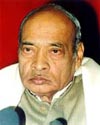

|
|
|
|
| HOME | BUSINESS | JRD TATA MEMORIAL LECTURE | |||
|
November 1, 1999
NEW GOVERNMENT
|
Invest in villages, else liberalisation process will be thrown into disarray, says Rao
Former prime minister P V Narasimha Rao today called for massive investments in villages to check the growing disparities in rural and urban economies. "At some point, the growing distance between the two can suddenly go beyond endurance and create tremendous internal social and economic strains, throwing the whole liberalisation programme itself into disarray and delay,'' Rao said while delivering the second JRD Tata Memorial Lecture in New Delhi. The lecture was organised by the Associated Chambers of Commerce and Industry or ASSOCHAM. Liberalisation envisaged infrastructure investment by private enterprise Making it clear that he wanted ''liberalisation to grow as a sturdy child,'' he said the reforms, embarked upon in 1991, envisaged a large portion of infrastructure investment by private enterprise and investment in human resources by the government.
''Smooth assimilation is the crux. I consider this to be the correct and lasting way to globalisation whose bottomline is partnership, not annexation,'' Rao said. Liberalisation is a process to transform society, not merely a business policy When liberalisation was conceived, it was meant as a means to transform the society -- purely as a socio-political process, not merely as a business policy or ploy. ''Unlike in some developed countries, unemployment is not a marginal or fractional phenomenon in India. Looking closely, one can perhaps find a nexus between the lack of full employment on the one hand and the emergence of multiple economies in the society on the other. The lower layer seldom gets the benefits of any technology-driven innovative progress,'' Rao said. ''In populous countries where millions of jobs are involved, employment needs to be accorded higher priority. If the developed countries, with their huge research and development establishment, could work in tandem with developing countries, that could be the ideal form of north-south cooperation.'' The rich and the poor of the whole world cannot break free from each other, he observed. In his welcome address, ASSOCHAM president K P Singh said the present gross domestic product growth of six per cent should go up to eight to ten per cent and called for implementation of the huge backlog of pending reforms.
|
| Tell us what you think of this report | |
|
HOME |
NEWS |
BUSINESS |
SPORTS |
MOVIES |
CHAT |
INFOTECH |
TRAVEL |
SINGLES BOOK SHOP | MUSIC SHOP | GIFT SHOP | HOTEL RESERVATIONS | MONEY EDUCATION | PERSONAL HOMEPAGES | FREE EMAIL | FEEDBACK |
|